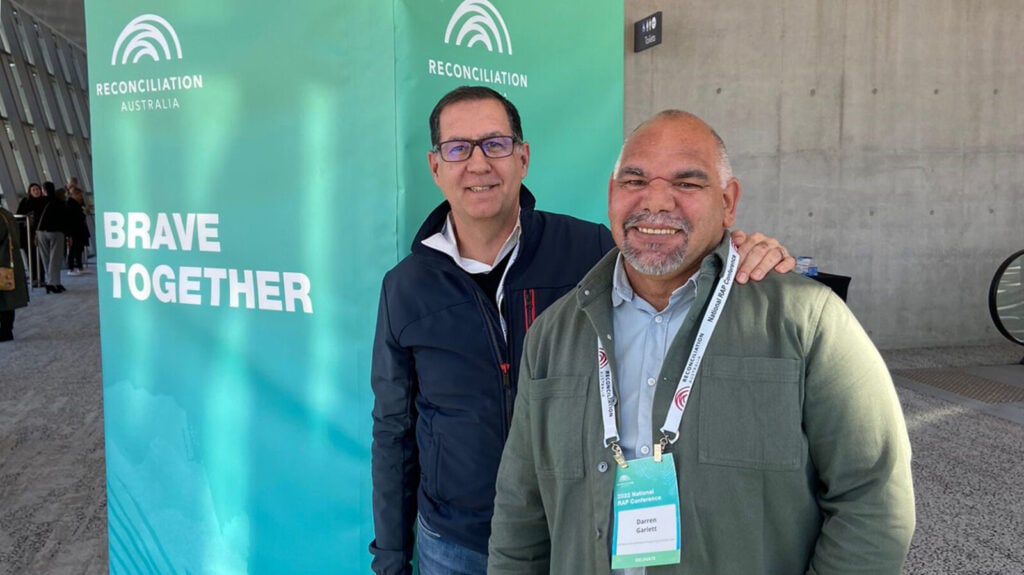
Australian Union Conference (AUC) representatives were among 720 people who attended the 2022 National Reconciliation Action Plan (RAP) Brave Together Conference held in Sydney from June 7 to 9, 2022.
Darren Garlett, director of Aboriginal and Torres Strait Islander Ministries (ATSIM) at AUC and Jacques Calais, associate national director of Adventist Schools Australia (ASA), joined the conference, where attendees were challenged to continue the unfinished work of reconciliation.
“The conference allowed us to sit at the table with other organisations who are undergoing the process of a RAP or already have one in place and enable us to network with people who are on the same journey as we are,” Garlett explained.
“It was really affirming to see so many non-Indigenous people in one place who are rallying for reconciliation, who support RAPs and want to do as much as they can to help us with reconciliation,” he added.
Having one Indigenous and one non-Indigenous representative allowed the union to view the reconciliation conference from different perspectives.
“I have never fully understood the hurt, the inequality, the heart, the pride, the struggles, and the desire for acceptance of our First Nations People,” Calais explained. “Attending the National RAP Conference with Darren has opened my eyes, and I am so grateful.”
One of the primary themes coming from the conference was the importance of listening to Indigenous people to gain understanding about why there is a need for reconciliation.
“They summed it up in three words,” Calais said. “We need to ‘sit and listen.’
“Non-Indigenous people don’t have the answers, we need to listen to their stories so we can understand. They are not looking for a handout, but they just want to be valued and respected in the community, not seen or treated as second-class citizens,” he added.
The Brave Together Conference included plenary sessions from First Nations People giving their perspectives on why reconciliation is important. Leaders of organisations also shared about challenges with their RAPs and how they have improved as a result. All sessions focused on how attendees can transform workplaces and the future of Australia.
Both Garlett and Calais agree that the RAP needs to be more than a set of policies that the church has completed.
“We can’t just write a Reconciliation Action Plan — tick a box — and all will be well. Our RAP must not be a symbolic document, but it must have substance so that we can actually be transformative and make a difference. We shouldn’t write the RAP just to look good — we should actually want to be good — as individuals and as a church,” Calais said. “It is not just about supporting Indigenous people. It is about us as a nation coming together and having one reconciled nation. It is also about educating non-Indigenous people about the real truths and the real history of this country, and this is something we can teach in our schools,” he added.
“The RAP is something that needs to be embraced on all levels, and sometimes it will take us in directions that we may not be comfortable in going,” Garlett said. “We need to change the way we look at reconciliation from a Christian point of view. We need to see reconciliation as important because we live in Australia and there is a divide in our nation, not just because it is the Christian thing to do,” he added.
The Reconciliation Action Plan is only one of 360 recommendations that came from the Royal Commission into Aboriginal Deaths in Custody, which is about breaking down the barriers between Aboriginal and non-Aboriginal, so there is still plenty of work to be done in this area.
“How can the church break down the barriers and show we truly care for people, rather than telling them we have the truth?” Calais asked. “By following Jesus’ example and building relationships with people. Show love, respect, and understanding for our First Nations People.”
AUC leaders said they hope to see many more leaders from the church around Australia attend the National Reconciliation Action Plan Conference planned for 2023.
The original version of this story was posted by Adventist Record.